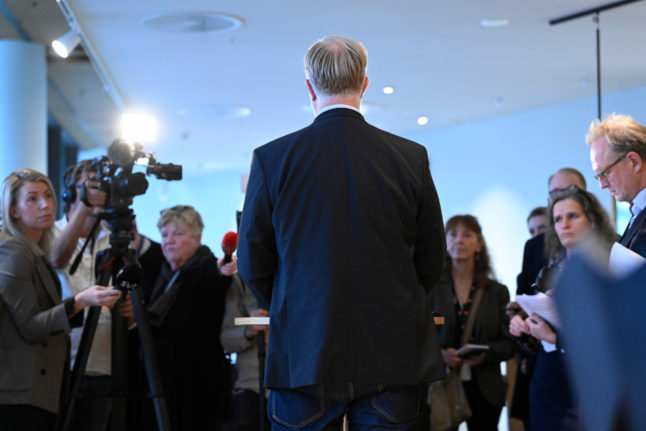Hej,
Johan Pehrson, who has been acting leader of the Liberals since Nyamko Sabuni’s sudden decision to step down in April, was two days ago formally voted in as party leader at the Liberals’ party conference in Stockholm.
His party is one of the four parties behind the Tidö Agreement, which enabled a coalition of the Moderates, Christian Democrats and Liberals to form a government after the election, with the support of the Sweden Democrats in parliament – an awkward friendship for the Liberals, who just years ago were frequently at odds with the latter far-right party.
Pehrson showed how awkward that friendship is when he the other day was quoted by the Expressen tabloid calling them “extreme populist” and “a brown sludge” – brown in this case means far right, a reference to the brown uniforms worn by many Nazi members in the 1930s’ Nazi Germany. (The Sweden Democrats rather unsurprisingly took umbrage to these labels, as the Tidö Agreement contains a clause expressly stating that the parties should speak “respectfully about each other’s key representatives”)
“I’m not the one who dragged the crap into this deal,” said Pehrson about the parts of the Tidö Agreement that Liberals may find less than palatable, arguing that his party had blocked more hardline migration policies.
“All the volume targets are gone, all the remigration targets are gone and a whole lot of other gross things,” Expressen quoted him as saying.
What isn’t off the table is a pledge to look into converting permanent residence permits to temporary permits, perhaps even retroactively.
That’s naturally concerning to many permanent residence holders in Sweden, but it’s also worth noting that the agreement really only pledges to launch an inquiry into how to go about it and that any changes would have to “occur within the framework of basic legal principles”.
This could mean that any inquiry concludes that converting permanent permits to temporary ones just isn’t possible under current legislation.
A key principle of the Swedish system of administrative law is that if an individual receives a positive decision from authorities about whatever, that decision cannot be revoked (with some extreme exceptions), so revoking the permanence of existing permits wouldn’t be possible.
But of course, as a lawyer The Local spoke to said, we don’t really know yet what kinds of changes to Swedish legislation the inquiry will propose.
In other news
More than 600 Swedish children and young people are taking the state of Sweden to court for doing too little to combat climate change.
Sweden Democrat member of parliament Björn Söder has put forward a motion to put the King in charge of nominating a prime ministerial candidate, a job currently held by the speaker of parliament.
The King of Sweden has no formal political power whatsoever, and we’ll talk about this more in the email I send to Sweden Elects subscribers next week (update your settings here to get the newsletter delivered straight to your inbox). Söder isn’t going to find much parliamentary support for his motion by the way; he’s put forward several similar motions in the past without success.
The ruling Moderate party’s youth wing has a new leader, Douglas Thor, who has said he wants the youth wing to be less ideological and focus more on policies that are practically possible to implement.
One of the MPs who was keen to take over as leader of the Centre Party when Annie Lööf steps down has instead thrown her support behind her colleague Daniel Bäckström, the party’s spokesperson on rural affairs. The party is set to vote in a new leader at a conference on February 2nd.
What’s next?
On Wednesday the Swedish parliament is set to vote on raising the minimum monthly salary for work permits from the current 13,000 kronor.
The proposal would raise the maintenance requirement for work permit applicants from outside the EU, the Nordic countries and Switzerland – and it looks likely to pass, as the three government parties, along with the Social Democrats and the Sweden Democrats are in favour of the move.
The proposal was put forward by the former Social Democrat government. The date of implementation is up to the government to decide, so it is not clear from what date a new salary threshold would be introduced.
You can read more about the proposal on The Local, here’s a link.
Sweden Elects is a weekly column by Editor Emma Löfgren looking at the big talking points and issues after the Swedish election. Members of The Local Sweden can sign up to receive the column as a newsletter in their email inbox each week. Just click on this “newsletters” option or visit the menu bar.




 Please whitelist us to continue reading.
Please whitelist us to continue reading.
Member comments